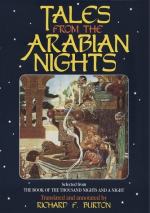Lane (Modern Egyptians, ch. 21-23) describes several other Arab romances, which have not yet been translated; viz. Aboo-Zeyd; Ez-Zahir, and Delhemeh.
3. Glaive-des-COURONNES (Seif el-Tidjan) Roman traduit de l’Arabe. Par M. le Dr. Perron (Paris, 1862).
A romantic story of Arab chivalry, less overloaded with supernaturalism than No. 137; but more supernatural than Antar. The hero marries (among other wives) two jinniyahs of the posterity of Iblis. In ch. 21 we have an account of a magical city much resembling the City of Brass (No. 134) and defended by similar talismans.
4. Mehemet the Kurd, and other tales, from Eastern sources, by Charles Wells, Turkish Prizeman of King’s College, London, and Member of the Royal Asiatic Society (London, 1865).
The first story, taken from an Arabic Ms., is a narrative of a handsome simpleminded man, with whom Princesses fall in love, and who is raised to a mighty throne by their enchantments. Some of the early incidents are not unlike those in the well-known German story of Lucky Hans (Hans im Glueck). In one place there is an enchanted garden, where Princesses disport themselves in feather-dresses (as in No. 155, &c.), and where magic apples grow. (Note that apples are always held in extraordinary estimation in The Nights, cf. Nos. 4 and 264.) Among the shorter stories we find No. 251h; a version of Nos. 9a and 152 (probably that referred to by Mr. Clouston as in the Tuti Nama); a story “The Prince Tailor,” resembling No. 251; No. 256, and one or two other tales not connected with The Nights. (Most of Wells’ shorter tales are evidently taken from the Forty Vezirs.)
5. Recueil des contes populaires de la Kabylie du Djardjara, recueillis et traduits par J. Riviere (Paris, 1882). I have not seen this book; but it can hardly fail to illustrate The Nights.
6. The story of Jewad, Romance by ’Ali ’Aziz Efendi the Cretan. Translated from the Turkish by E. J. W. Gibb, M.R.A.S., &c. (Glasgow, 1884).
A modern Turkish work, written in A. H. 1211 (1796-97). It contains the following tales:—
The Story of Jew d.
1. The Story of Eb -’Ali-Sin ;. 2.
The Story of Monia Em n. 3. The Story of
Ferah-N z, the daughter of the King of China.
a. The Story
of Khoja ’Abdu-llah.
4. The Story told by Jew d to Iklilu’l
Mulk.
a. The Story
of Sh b r and Hum .
c. The Story
of Ghazanfer and R hila.
5. The Story of Qara Khan.
The following deserve notice from our present point of view:—
The Story of Jewad.—Here we have magical illusions, as in Nos. 247 and 251a. Such narratives are common in the East; Lane (Nights, ch. i., note 15) is inclined to attribute such illusions to the influence of drugs; but the narratives seem rather to point to so-called electro-biology, or the Scotch Glamour (such influences, as is notorious, acting far more strongly upon Orientals than upon Europeans).




